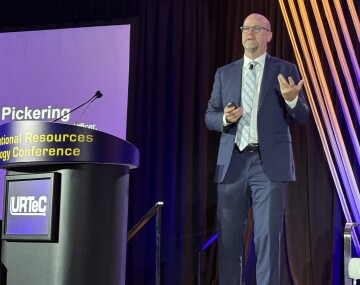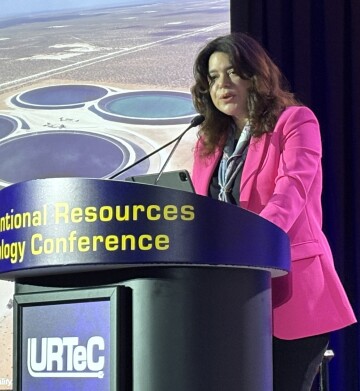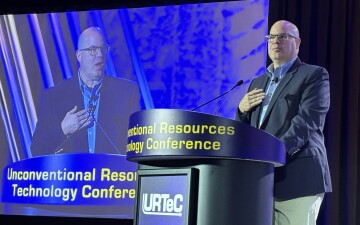Operators can help the Permian Basin continue to be the “gift that keeps giving” by extracting more oil and gas from unconventional reservoirs.
Oil prices are expected to drop before they improve, but opportunities remain for operators with production from unconventional reservoirs, speakers said during the opening plenary at the Unconventional Resources Technology Conference in Houston on 9 June.

Dan Pickering, founder and CIO of Pickering Energy Partners, said that while energy demand is likely to only grow over time, things might be tough for oil over the next 18 to 24 months.
He noted that US President Trump’s focus on “drill, baby, drill” strategy—aimed at lowering energy prices for American consumers—could contribute to oil prices dipping into the $50s/bbl before rising back up to the $70s.
And while it has been suggested, notably by Diamondback CEO Travis Stice, that US production has peaked, Pickering both agrees and disagrees.
“US production has probably peaked for oil at $65 (per barrel). Oil at $95, I think there’s plenty of locations that (could) likely supply growth,” he said.
The US produces “price-sensitive” barrels, compared to output from OPEC members. “As price-insensitive barrels enter the market, they will push out the price-sensitive barrels,” he said.
Pickering said the industry needs to try other things—from additional exploration to getting more out of existing reservoirs. The biggest opportunity comes from the vast remaining reserves within unconventional reservoirs.
“Shale won't give forever. So, it's going to mature. One of the challenges to this audience, this industry, is to stretch it out, make it give longer than it wants to,” he said, noting technology will be a key piece.
Thaimar Ramirez, president and general manager of the Midland Basin business unit, Oxy, called the Permian the gift that keeps giving and said tremendous potential remains. Increasing efficiency of recovery is the main theme in the area. Recovery factors in the “single digits” are not acceptable, and companies need to rethink their approach to maximizing recovery and when to initiate tertiary recovery, she said.

Leen Weijers, SVP of engineering at Liberty Energy, said technologies available through service companies can help operators be more efficient and produce oil at lower costs to make those barrels less price-sensitive.“There’s still a lot of room left to squeeze more juice out of what we have left,” he said.
Advanced Resources International CEO George Koperna said the industry must focus more on secondary production in existing reservoirs. “There’s a lot of milkshake we’ve paid for and are still not getting,” he said, referring to reserves left behind following primary extraction.
He also said that moving forward, the industry must strive to collapse the learning curve for emerging plays.
And while unconventional resources exist around the world, they need technical savvy to unlock them, Koperna said. That means, Weijers said, the industry needs to export its knowledge.
Technology, including artificial intelligence (AI) will also play a role.
Vast Potential
There’s no doubt, panelists said, that AI has the potential to make a difference in the industry.
Ramirez said Oxy already has more than 200 use cases where there is a value proposition for deploying AI technology. Alongside that possibility, however, is concern about job security.

“The majority of people are worried about their jobs,” she said, adding that doesn’t have to be the case because the intent behind AI deployments is to eliminate routine tasks.
“The message is: ‘AI is going to change the job, so actually, you can focus on more tasks that are more strategic,’” she said.
AI is coming, and it will affect workers.
“If you are not into AI, I highly recommend you get used to it, comfortable, or comfortably uncomfortable, if you will,” Ramirez said.
Pickering also urged workers to embrace AI. “Our workflows are going to be so much different, and it's going to happen fast,” he said. “I don’t think any of us know exactly how that will work. It would be really organic, but it’s a big deal.”
Next-Gen Demand, Workforce
While the expectation is that oil and gas will continue as a major part of the energy mix for the foreseeable future, it’s less clear how to encourage young professionals to choose a career in the energy industry.
Weijers said that to some extent the industry is a victim of its own success, at least in terms of how much more efficient it has become. That said, he added, there is still plenty of opportunity to expand the industry’s impact.

Koperna said the industry needs to change the narrative.
“I don’t think people saying we’re at peak oil helps,” he said.
Pickering said changing the narrative may be tough and suggested pulling workers from other fields as an approach.
“I think we’re actually really good at pulling in experienced people from (other) industries into our industry,” he said. “Getting the idealistic college student to come work—it's tough. Getting a more realistic 25- or 30-year-old to change careers is, I think, a little bit easier.”


